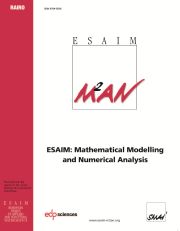Article contents
Robust operator estimates and the application to substructuringmethods for first-order systems
Published online by Cambridge University Press: 13 August 2014
Abstract
We discuss a family of discontinuous Petrov–Galerkin (DPG) schemes for quite generalpartial differential operators. The starting point of our analysis is the DPG methodintroduced by [Demkowicz et al., SIAM J. Numer. Anal.49 (2011) 1788–1809; Zitelli et al., J.Comput. Phys. 230 (2011) 2406–2432]. This discretization resultsin a sparse positive definite linear algebraic system which can be obtained from a saddlepoint problem by an element-wise Schur complement reduction applied to the test space.Here, we show that the abstract framework of saddle point problems and domaindecomposition techniques provide stability and a priori estimates. Toobtain efficient numerical algorithms, we use a second Schur complement reduction appliedto the trial space. This restricts the degrees of freedom to the skeleton. We construct apreconditioner for the skeleton problem, and the efficiency of the discretization and thesolution method is demonstrated by numerical examples.
Information
- Type
- Research Article
- Information
- ESAIM: Mathematical Modelling and Numerical Analysis , Volume 48 , Issue 5 , September 2014 , pp. 1473 - 1494
- Copyright
- © EDP Sciences, SMAI 2014
References
- 11
- Cited by

